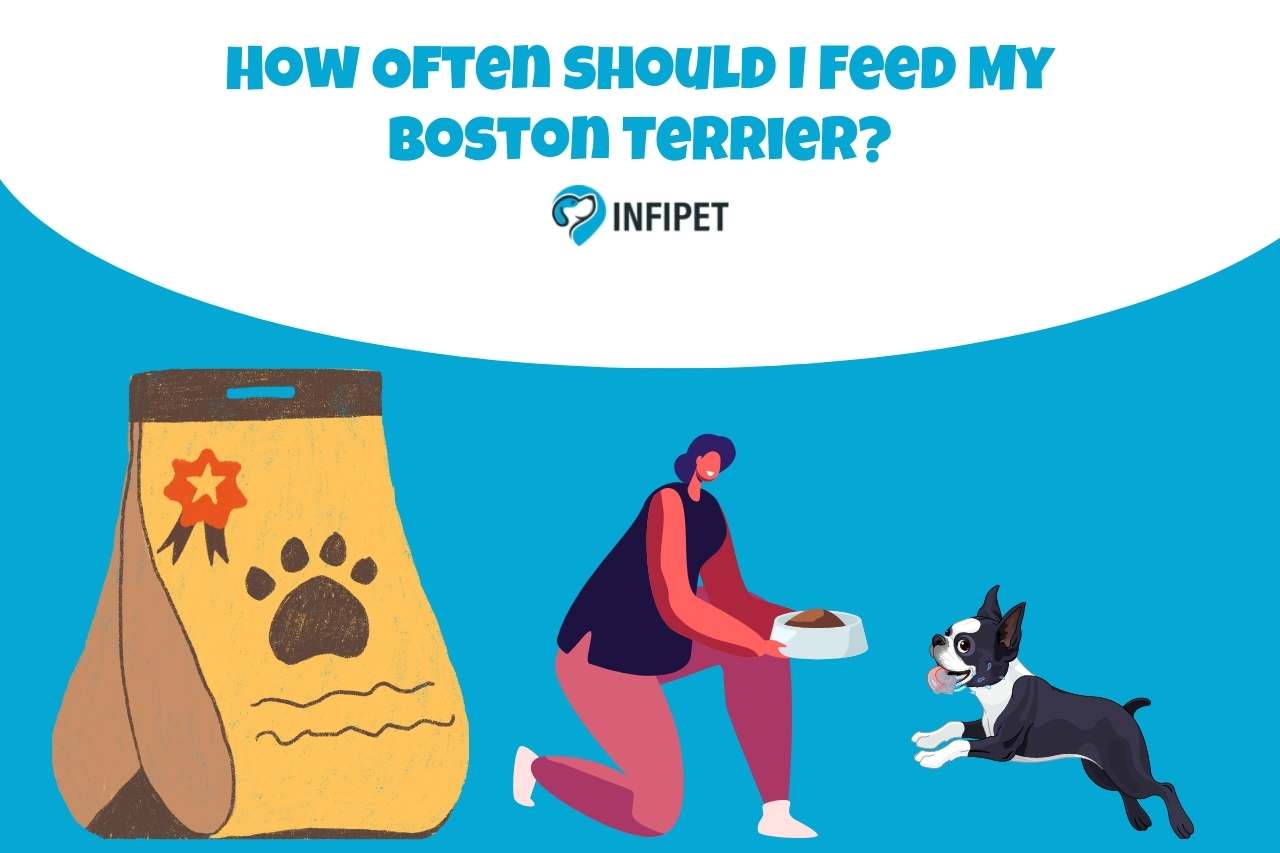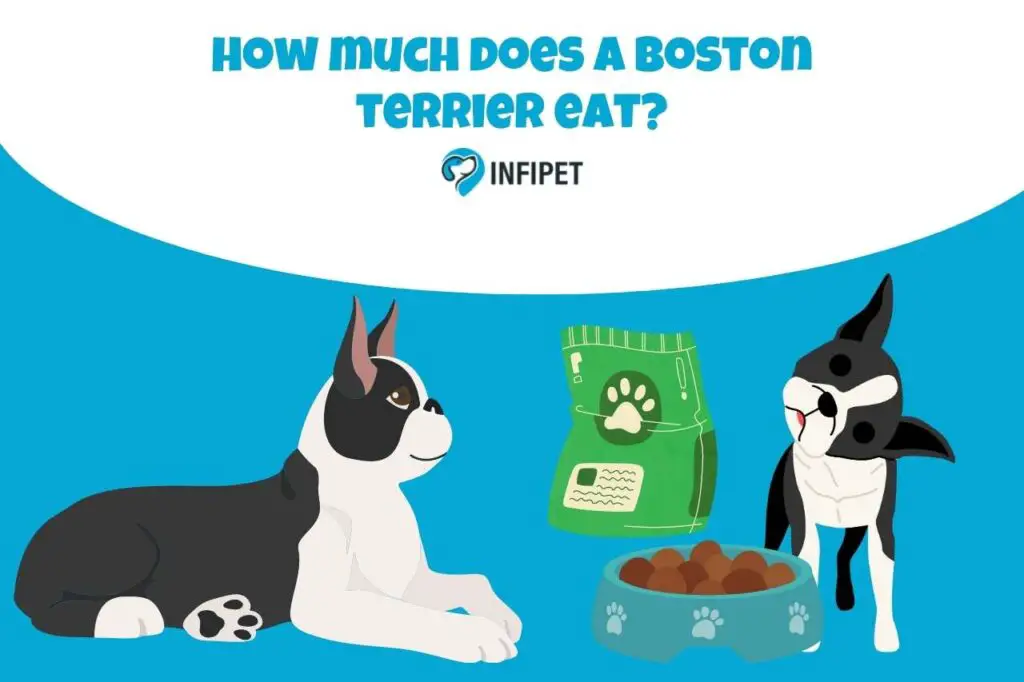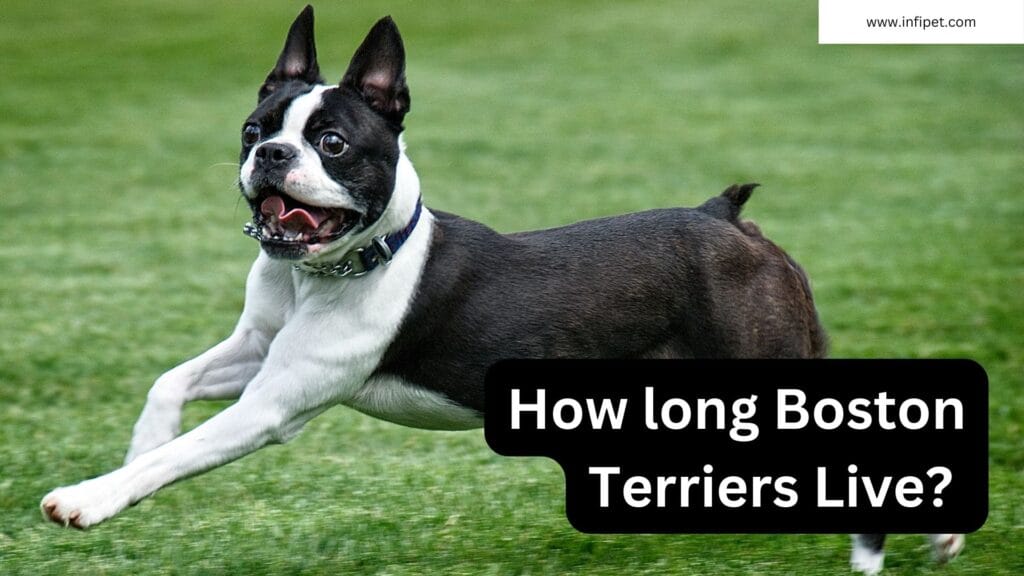You should adjust the meal size according to your dog’s weight, exercise level, and overall health. Regularly monitoring your Boston Terrier’s weight and general health is essential. Different formulations may have different calorie densities, changing the recommended portion sizes. This article will cover a wide range of topics, including giving your Boston Terrier the healthiest meals and managing their food intake. So, yeah, let’s talk about how much does a Boston Terrier eat.
How Much Food does a Boston Terrier Eat a Day?
Generally speaking, mature Boston Terriers require 1/2 to 1 1/2 cups of premium dry dog food day, split between two meals. Individual Boston Terriers may have particular nutritional requirements, so frequently checking your dog’s weight and overall health is important.
You might need to adjust your Boston Terrier’s food portions if they gain weight or seem too skinny. Remember that malnutrition can occur from underfeeding, while overfeeding can cause obesity and other health problems.
Consider speaking with a veterinarian or a qualified canine nutritionist to establish the precise amount of food your Boston Terrier requires. They can evaluate your dog’s needs and provide a custom feeding schedule based on those needs and lifestyles.
Additionally, always adhere to the feeding recommendations offered by the dog food manufacturer you select, as various formulations may have various calorie densities, altering the suggested portion sizes.
Boston Terrier Feeding Chart by Age
Age-specific Boston Terrier Feeding Chart
8 weeks to 6 months old puppy:
- 8 to 12 weeks: 3 to 4 servings of 1/4 to 1/2 cups of puppy food daily.
- 12 to 24 weeks: 3 times daily servings of 1/2 to 3/4 cup of puppy food.
- 3/4 to 1 cup of puppy food, three times a day, for 24 weeks to 6 months.
Teenager (between six and twelve months):
6 to 9 months: 2 times daily servings of 3/4 to 1 cup of premium dry dog food.
9 to 12 months: 2x a day, 1/2 to 3/4 cup of premium dry dog food.
Adults (aged one to seven):
- 1 to 3 years: 2 meals of 1/2 to 1 1/2 cups of premium dry dog food.
- 1/2 to 1 1/4 cups of premium dry dog food, divided into 2 meals for ages 4 to 7.
Senior (above the age of seven):
- High-quality dry dog food, divided into 2 servings of 1/2 to 1 cup each. (Feeding amounts may change depending on the person’s age and level of exercise.)
What should I Feed My Boston Terrier?
- Choose a high-end commercial dog food for small breeds or all-life phases. Choose well-known brands that use premium ingredients and have been tested to ensure their nutritional suitability.
- Like all dogs, Boston Terriers need sufficient protein in their diet. Protein aids in the growth and repair of muscles.
- Dog food should have a good combination of carbohydrates, proteins, fats, vitamins, and minerals.
- Avoid feeding your dog meals with many fillers, artificial flavours, colours, or preservatives. These additives have little nutritional value and cannot be good for your pet’s health.
- If your Boston Terrier has particular nutritional needs or allergies, consider these issues while choosing a diet. For canines with sensitive stomachs, skin allergies, or requirements for weight management, dog foods are available.
- Follow the feeding recommendations on the dog food container and modify the portion amount according to the age, weight, and activity level of your Boston Terrier. Obesity can result from overeating, and nutritional deficits might result from undereating.
Foods to Avoid Feeding your Boston Terrier
- Theobromine and caffeine in chocolate are poisonous to dogs and can cause symptoms like vomiting, diarrhoea, rapid breathing, an accelerated heartbeat, seizures, or even death.
- Dogs who consume grapes and raisins risk developing kidney failure, which manifests as vomiting, fatigue, and reduced urine production.
- All types of raw, cooked, powdered onion and garlic can harm a dog’s red blood cells and result in anaemia.
- The chemical person, poisonous to dogs and upset their stomachs, is found in avocados.
- Dogs who drink alcohol may experience serious health problems such as vomiting, confusion, lack of coordination, breathing difficulties, and in extreme circumstances, coma or death.
- Cooked bones may splinter, endangering dogs’ choking or causing intestinal obstructions. It is recommended to avoid giving your pet any kind of bone.
- Dogs who consume high-fat diets such as fatty meats, butter, and copious amounts of cheese may get pancreatitis, a painful ailment that poses a serious risk to their lives.
- Salty foods can cause dogs to become sodium ion poisoned, resulting in symptoms like vomiting, diarrhoea, tremors, and seizures.
- While some dogs can tolerate small amounts of plain yoghurt or cottage cheese without experiencing any digestive problems, many are lactose intolerant.
- Coffee, tea, and energy drinks all contain caffeine, which can be hazardous to dogs and cause agitation, fast breathing, heart palpitations, and muscle trembling.
- Dogs who consume certain nuts, such as macadamia, may experience heat, vomiting, and signs of weakness.

How Often should I Feed My Boston Terrier?
- Puppies typically need more frequent feedings since they have increased energy needs for growth and development. 3 to 4 meals should be given to your Boston Terrier puppy each day.
- When your Boston Terrier reaches puberty, you can cut back to two to three meals daily.
- With two meals a day—one in the morning and one in the evening—most adult Boston Terriers do well.
- Boston Terriers’ metabolisms may slow down, and they might become less active as they get older. Even though eating two meals daily is still customary, you might need to reduce your portion sizes to avoid gaining weight.
Should I Follow a Feeding Schedule for My Boston Terrier?
- Setting mealtimes in advance can help your Boston Terrier’s digestive tract stay in check. They will learn to know when to eat, and this constancy can avoid gastrointestinal problems and unhappy stomachs.
- A feeding plan enables you to regulate portion sizes and prevents overeating, which can cause obesity and related health issues in Boston Terriers.
- Feeding your dog at regular intervals might help you anticipate when they need to go potty, making potty training go more smoothly.
- You may more successfully monitor your Boston Terrier’s eating habits by feeding at set times. Appetite changes may be a sign of potential health problems.
Why is My Boston Terrier Always Hungry?
Analyze the frequency and volume of your dog’s meals. They could appear hungry and ask for food if they don’t get enough during their usual meals. The dog can feel compelled to eat more to meet their nutritional needs if their diet lacks important nutrients.
It’s critical to get veterinary advice if you detect a sudden and severe change in your Boston Terrier’s appetite to rule out any underlying medical issues.
Dogs could overeat because they are bored or lead a sedentary lifestyle. Ensure your Boston Terrier receives enough mental and physical stimulation to keep them interested and prevent overeating. Even when they are not hungry, some dogs may start acting like they are and develop begging habits.
Your Boston Terrier may routinely beg if they have discovered that doing so earns them rewards or more food. If you have a Boston Terrier puppy developing, it could go through growth spurts that cause them to be hungrier.
What to Do If My Boston Terrier is Overweight and Underweight?
Make an appointment with your veterinarian before changing your dog’s food or activity regimen. They may evaluate the general health of your Boston Terrier, determine whether they are overweight, and rule out any underlying medical disorders that might be causing the weight increase.
Your veterinarian might suggest a particular dog food for weight management or offer portion control tips to help you consume fewer calories. Please don’t give your dog too many snacks or table scraps because these can make them acquire weight.
To assist your Boston Terrier in burning calories and lose extra weight, enhance their physical activity. Exercise can be useful in the form of walks, games, and other activities.
Watch this video to get more info,
Video Credits – Little Paws Training
You May Also Like



